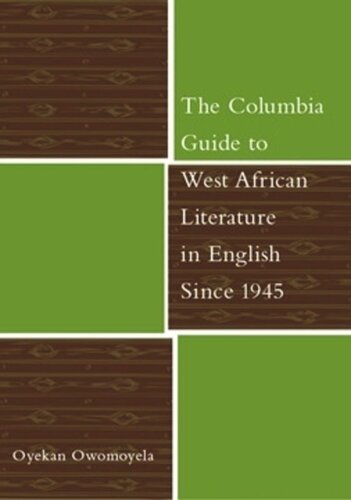

Most ebook files are in PDF format, so you can easily read them using various software such as Foxit Reader or directly on the Google Chrome browser.
Some ebook files are released by publishers in other formats such as .awz, .mobi, .epub, .fb2, etc. You may need to install specific software to read these formats on mobile/PC, such as Calibre.
Please read the tutorial at this link: https://ebookbell.com/faq
We offer FREE conversion to the popular formats you request; however, this may take some time. Therefore, right after payment, please email us, and we will try to provide the service as quickly as possible.
For some exceptional file formats or broken links (if any), please refrain from opening any disputes. Instead, email us first, and we will try to assist within a maximum of 6 hours.
EbookBell Team

4.3
18 reviewsComposed by a premier scholar of African literature, this volume is a comprehensive guide to the literary traditions of Gambia, Sierra Leone, Liberia, Ghana, and Nigeria, five distinct countries bound by their experience with colonialism. Oyekan Owomoyela begins with an overview of the authors, texts, and historical events that have shaped the development of postwar Anglophone literatures in this region, exploring shifts in theme and the role of foreign sponsorship and illuminating recent debates regarding the language, identity, gender, and social commitments of various authors and their works. His introduction concludes with a bibliography of key critical texts.
The second half of the volume is an alphabetical tour of writers, publications, concepts, genres, movements, and institutions, with suggested readings for further research. Entries focus primarily on fiction but also touch on drama and poetry. Featured authors include Chris Abani, Chinua Achebe, Chimamanda Ngozi Adichie, Cyprian Ekwensi, Uzodinma Chukuka Iweala, Helen Oyeyemi, and Wole Soyinka. Topics range from the European origins of African literature and the West African diaspora to the development of an "African personality," the establishment of a regional publishing industry, and the global literary marketplace. Owomoyela also discusses such influences as the postwar emergence of Onitsha Market Literature, the Mbari Club, and the importance of the Noma Award.
Owomoyela's portrait points to the major impact of West African literature on the evolution of both African and world literatures in English. Sure to become the definitive text for research in the field, The Columbia Guide to West African Literature in English Since 1945 is a vital resource for newcomers as well as for advanced scholars seeking a deeper understanding of the region's rich literary heritage.